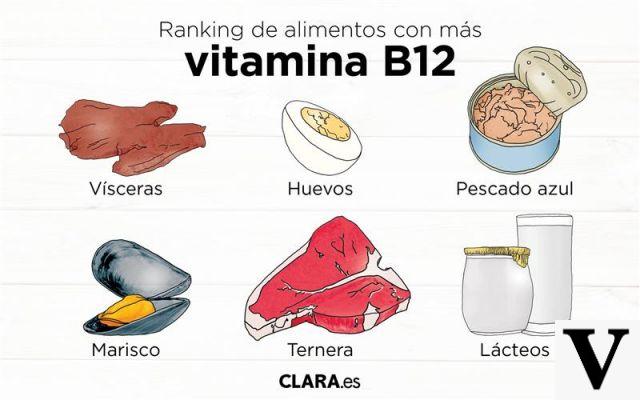
There are several reasons for taking vitamin B12 supplements:
- correction of specific dietary deficiencies, for example in case of calorie-protein malnutrition, Crohn's disease or malabsorption syndromes;
- treatment of pernicious anemia (blood disease caused by chronic vitamin B12 deficiency);
- intrinsic factor deficiency, a substance produced by the stomach essential for the proper absorption of vitamin B12, for example in cases of gastric resection, bariatric surgery or atrophic gastritis
- hypochlorhydria or achlorhydria → reduced gastric acidity (resulting for example from the use of drugs for the treatment of gastritis, peptic ulcer, hiatal hernia and gastroesophageal reflux) reduces the absorption of vitamin B12
- prevention of vitamin B12 deficiencies, for example in the case of a vegan diet, alcoholism or celiac disease
- attempt to correct anemic forms, such as sports pseudoanemia. In this case, vitamin B12 is typically taken together with iron and folic acid supplements
- prevent the increased cardiovascular risk associated with high blood levels of homocysteine. In this case, vitamin B12 supplements should be combined with others of folic acid, betaine and vitamin B6.
- prevent vitamin B12 deficiencies caused by prolonged use of drugs, such as aminosalicylic acid, metformin, broad spectrum antibiotics, H2 antagonists and proton pump inhibitors.
In this regard, we remind you that:
- the recommended daily intake of vitamin B12 is in the order of 2-3 µg for the adult population
- in case of hypochlorhydria or intrinsic factor deficiency, vitamin B12 supplements should be taken in doses much higher than the recommended daily requirement, up to 1000 µg per day according to medical indications (sometimes intravenous administration of specific vitamin-based drugs is preferred B12). Such high doses mean that the passive absorption, normally minority compared to that mediated by the intrinsic factor, ensures the organism sufficient quantities of vitamin B12.
- as far as vitamin B12 is concerned, the dangers of overdose toxicity in healthy subjects are practically nil
- the best food sources of vitamin B12 are foods of animal origin, such as meat, milk, eggs, fish and fishery products.
| Alimony | Bioavailability * | Vitamin B12 content (μg / 100 g) | |
| MEAT ANIMALS | |||
| Cooked Mutton | 56% –89% | 2.6 | |
| Cooked Chicken | 61% –66% | 9.4 | |
| COW MILK | 65% (25) | 0.4 | |
| EGGS | |||
| Chicken eggs, cooked | <9% | 1.3 | |
| FISHING PRODUCTS | |||
| Oysters | ND | 46.3, 28.1 | |
| Mussels | ND | 15.7, 10.3 | |
| Clams | ND | 37.0, 52.4 | |
| FISH MEAT | |||
| Skipjack tuna, dark muscle | ND | 158.5 | |
| Yellowfin tuna, dark muscle | ND | 52.9 | |
| Rainbow trout, cooked | 42.0% | 4.9 | |
- Vitamin B12 contained in blue algae (cyanobacteria such as Spirulina and Klamath Algae) is considered poorly bioavailable for the human body. Therefore, the use of such supplements is not recommended to prevent vitamin B12 deficiencies in vegans, much less to correct any deficiencies. Vitamin B12 present in other types of algae, such as nori algae and some eukaryotic microalgae (Chlorella sp. And Pleurochrysis carterae), seems to be more bioavailable. See the reference article for bibliographic details.
- in the absence of specific deficiencies, it is quite optimistic to hope to increase sports performance in aerobic sports by taking vitamin B12 supplements and other nutrients (iron and folate) essential for the correct synthesis of red blood cells. Only a blood test with a vitamin B12 dosage will be able to highlight any deficiencies
- To be useful for their intended purposes, vitamin B12 supplements must contain the vitamin in a biologically active and stable form (generally cyanocobalamin or cobamamide, but also hydroxocobalamin, adenosylcobalamin and methylcoballamin).


























